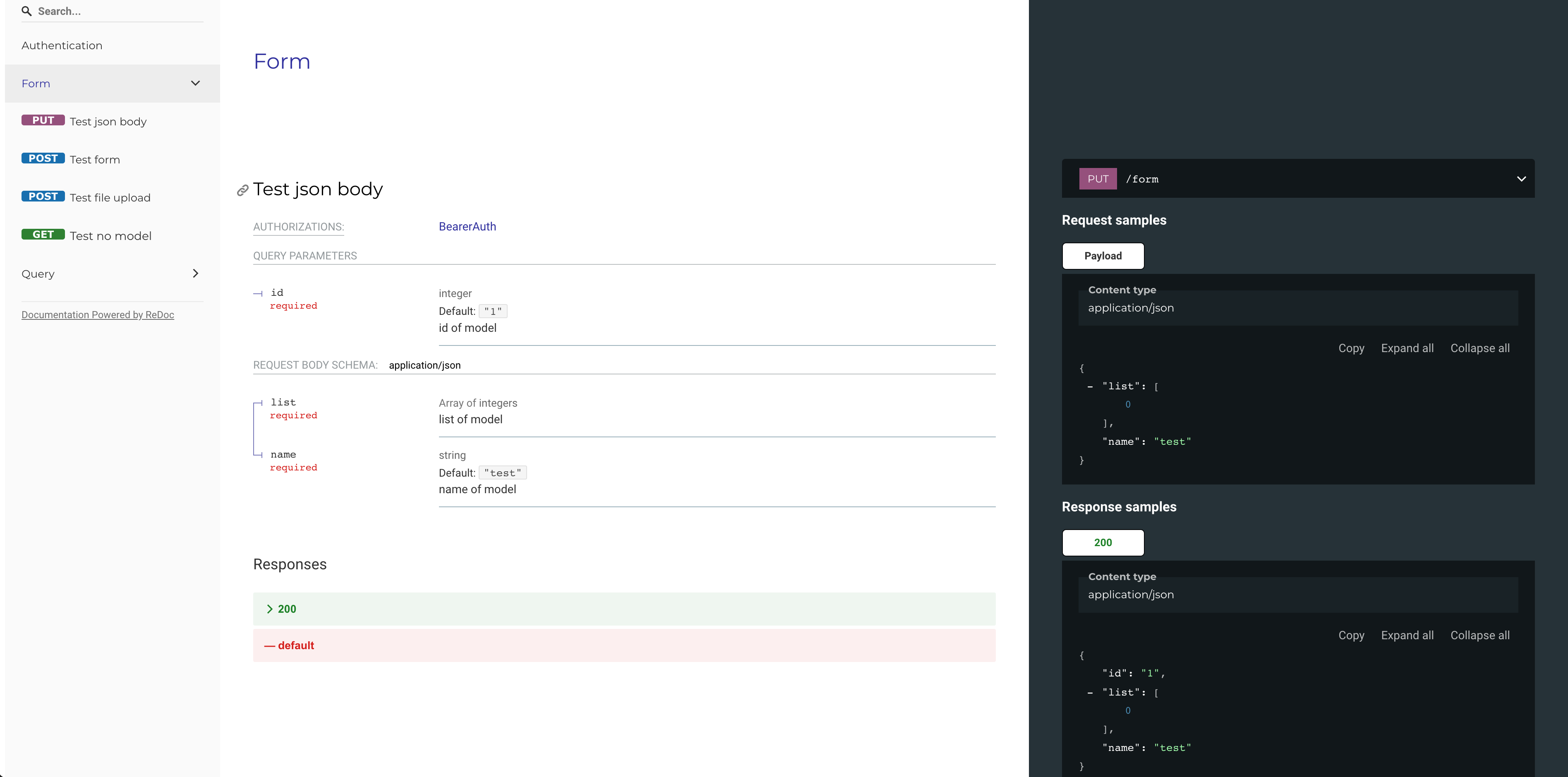https://github.com/long2ice/fibers
Fiber + Swagger = Fibers, a web framework dedicated to providing a FastAPI-like development experience
https://github.com/long2ice/fibers
fastapi fiber golang openapi redoc swagger swagger-ui
Last synced: 7 months ago
JSON representation
Fiber + Swagger = Fibers, a web framework dedicated to providing a FastAPI-like development experience
- Host: GitHub
- URL: https://github.com/long2ice/fibers
- Owner: long2ice
- License: apache-2.0
- Created: 2022-03-04T11:38:12.000Z (almost 4 years ago)
- Default Branch: dev
- Last Pushed: 2024-05-28T03:22:36.000Z (over 1 year ago)
- Last Synced: 2025-04-04T18:47:09.279Z (10 months ago)
- Topics: fastapi, fiber, golang, openapi, redoc, swagger, swagger-ui
- Language: Go
- Homepage: https://fibers.long2ice.io/docs
- Size: 831 KB
- Stars: 28
- Watchers: 2
- Forks: 5
- Open Issues: 2
-
Metadata Files:
- Readme: README.md
- License: LICENSE
- Security: security/apikey.go
Awesome Lists containing this project
README
# Fiber + Swagger = Fibers
[](https://github.com/long2ice/fibers/actions/workflows/deploy.yml)
[](https://pkg.go.dev/github.com/long2ice/fibers)
## Introduction
`Fibers` is a web framework based on `Fiber` and `Swagger` inspired by [FastAPI](https://github.com/tiangolo/fastapi),
which wraps `Fiber` and provides built-in swagger api docs
and request model validation.
## Why I build this project?
Previous I have used [FastAPI](https://github.com/tiangolo/fastapi), which gives me a great experience in api docs
generation and api writing, because nobody like writing api docs.
Now I use `Fiber` but I can't found anything like that, I found [swag](https://github.com/swaggo/swag) but which write
docs with comment is so stupid. So there is `Fibers`.
## Requirements
- Go >= 1.18, because of generic usage.
## Installation
```shell
go get -u github.com/long2ice/fibers
```
## Online Demo
You can see online demo at or .


And you can see the code in [examples](https://github.com/long2ice/fibers/tree/dev/examples).
## Usage
### Build Swagger
Firstly, build a swagger object with basic information.
```go
package examples
import (
"github.com/getkin/kin-openapi/openapi3"
"github.com/long2ice/fibers/swagger"
)
func NewSwagger() *swagger.Swagger {
return swagger.New("Fibers", "Swagger + Fiber = Fibers", "0.1.0",
swagger.License(&openapi3.License{
Name: "Apache License 2.0",
URL: "https://github.com/long2ice/fibers/blob/dev/LICENSE",
}),
swagger.Contact(&openapi3.Contact{
Name: "long2ice",
URL: "https://github.com/long2ice",
Email: "long2ice@gmail.com",
}),
swagger.TermsOfService("https://github.com/long2ice"),
)
}
```
### Write API
Then make func which is type `F func(c *fiber.Ctx, req T) error`.
```go
package examples
import "github.com/gofiber/fiber/v2"
type TestQueryReq struct {
Name string `query:"name" validate:"required" json:"name" description:"name of model" default:"test"`
}
func TestQuery(c *fiber.Ctx, req TestQueryReq) error {
return c.JSON(req)
}
// TestQueryNoReq if there is no req body
func TestQueryNoReq(c *fiber.Ctx) error {
return c.SendString("xxx")
}
```
#### All supported tags
| name | description |
|---------------|-----------------------------------------------------------------|
| `query` | binding query param |
| `cookie` | binding cookie param |
| `form` | binding form param |
| `json` | binding json body |
| `uri` | binding path param |
| `header` | binding header param |
| `validate` | [validator](https://github.com/go-playground/validator) support |
| `description` | swagger docs param description |
| `example` | swagger docs param example |
| `default` | swagger docs param default value |
| `embed` | embed struct params or body |
Note that the attributes in `TestQuery`? `Fibers` will validate request and inject it automatically, then you can use it
in handler easily.
### Write Router
Then write router with some docs configuration and api.
```go
package examples
var query = router.New(
TestQuery,
router.Summary("Test Query"),
router.Description("Test Query Model"),
router.Tags("Test"),
)
// if there is no req body
var query = router.NewX(
TestQueryNoReq,
router.Summary("Test Query"),
router.Description("Test Query Model"),
router.Tags("Test"),
)
```
### Security
If you want to project your api with a security policy, you can use security, also they will be shown in swagger docs.
Current there is five kinds of security policies.
- `Basic`
- `Bearer`
- `ApiKey`
- `OpenID`
- `OAuth2`
```go
package main
var query = router.New(
TestQuery,
router.Summary("Test query"),
router.Description("Test query model"),
router.Security(&security.Basic{}),
)
```
Then you can get the authentication string by `c.Locals(security.Credentials)` depending on your auth type.
```go
package main
import "github.com/gofiber/fiber/v2"
func TestQuery(c *fiber.Ctx, req TestQueryReq) error {
user := c.Locals(security.Credentials).(security.User)
fmt.Println(user)
return c.JSON(req)
}
```
### Mount Router
Then you can mount router in your application or group.
```go
package main
import "github.com/gofiber/fiber/v2"
func main() {
app := fibers.New(NewSwagger(), fiber.Config{})
queryGroup := app.Group("/query", fibers.Tags("Query"))
queryGroup.Get("", query)
queryGroup.Get("/:id", queryPath)
queryGroup.Delete("", query)
app.Get("/noModel", noModel)
}
```
### Start APP
Finally, start the application with routes defined.
```go
package main
import (
"github.com/gin-contrib/cors"
"github.com/gofiber/fiber/v2"
"github.com/long2ice/fibers"
)
func main() {
app := fibers.New(NewSwagger(), fiber.Config{})
app.Use(
logger.New(),
recover.New(),
cors.New(),
)
subApp := fibers.New(NewSwagger(), fiber.Config{})
subApp.Get("/noModel", noModel)
app.Mount("/sub", subApp)
app.Use(cors.New(cors.Config{
AllowOrigins: "*",
AllowMethods: "*",
AllowHeaders: "*",
AllowCredentials: true,
}))
queryGroup := app.Group("/query", fibers.Tags("Query"))
queryGroup.Get("/list", queryList)
queryGroup.Get("/:id", queryPath)
queryGroup.Delete("", query)
app.Get("/noModel", noModel)
formGroup := app.Group("/form", fibers.Tags("Form"), fibers.Security(&security.Bearer{}))
formGroup.Post("/encoded", formEncode)
formGroup.Put("", body)
formGroup.Post("/file", file)
log.Fatal(app.Listen(":8080"))
}
```
That's all! Now you can visit or to see the api docs. Have
fun!
### Disable Docs
In some cases you may want to disable docs such as in production, just put `nil` to `fibers.New`.
```go
app = fibers.New(nil, fiber.Config{})
```
### SubAPP Mount
If you want to use sub application, you can mount another `SwaGin` instance to main application, and their swagger docs
is also separate.
```go
package main
import "github.com/gofiber/fiber/v2"
func main() {
app := fibers.New(NewSwagger(), fiber.Config{})
subApp := fibers.New(NewSwagger(), fiber.Config{})
subApp.Get("/noModel", noModel)
app.Mount("/sub", subApp)
}
```
## ThanksTo
- [kin-openapi](https://github.com/getkin/kin-openapi), OpenAPI 3.0 implementation for Go (parsing, converting,
validation, and more).
- [Fiber](https://github.com/gofiber/fiber), Express inspired web framework written in Go.
## License
This project is licensed under the
[Apache-2.0](https://github.com/long2ice/fibers/blob/master/LICENSE)
License.